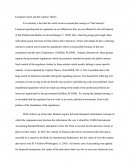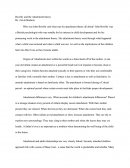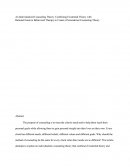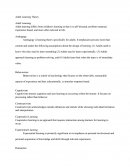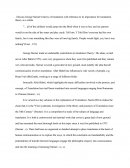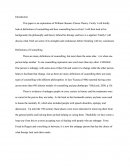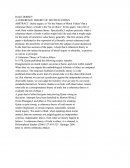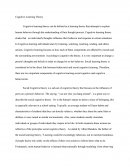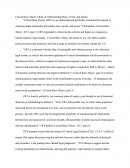Reliability theory exercises essays
Last update: December 29, 2015-
Motivation Theory by Richard Romando
Motivation Theory By Richard Romando The word motivation is coined from the Latin word "movere", which means to move. Motivation is defined as an internal drive that activates behavior and gives it direction. The term motivation theory is concerned with the processes that describe why and how human behavior is activated and directed. It is regarded as one of the most important areas of study in the field of organizational behavior. There are two different
Rating:Essay Length: 379 Words / 2 PagesSubmitted: August 10, 2011 -
Social Learning Theory
Social learning theory focuses on the learning that occurs within a social context. It considers that people learn from one another, including such concepts as observational learning, imitation, and modeling. Among others Albert Bandura is considered the leading proponent of this theory. General principles of social learning theory follow: 1. People can learn by observing the behavior is of others and the outcomes of those behaviors. 2. Learning can occur without a change in behavior.
Rating:Essay Length: 1,177 Words / 5 PagesSubmitted: August 12, 2011 -
Management Theory
Gantt Chart During the era of scientific management, Henry Gantt developed a tool for displaying the progression of a project in the form of a specialized chart. An early application was the tracking of the progress of ship building projects. Today, Gantt's scheduling tool takes the form of a horizontal bar graph and is known as a Gantt chart, a basic sample of which is shown below: Gantt Chart Format Task Duration Jan Feb Mar
Rating:Essay Length: 469 Words / 2 PagesSubmitted: August 13, 2011 -
Herzberg's Motivation-Hygiene Theory
Two Factor Theory (also known as Herzberg's Motivation-Hygiene Theory) was developed by Frederick Herzberg, a psychologist who found that job satisfaction and job dissatisfaction acted independently of each other. Two Factor Theory states that there are certain factors in the workplace that cause job satisfaction, while a separate set of factors cause dissatisfaction. (Herzberg, Mausner & Snyderman 1959). Two Factor Theory distinguishes between: * Motivators; (e.g. challenging work, recognition, responsibility) which give positive satisfaction, arising
Rating:Essay Length: 2,304 Words / 10 PagesSubmitted: August 13, 2011 -
An Educational Leadership Framework Based on Traditional and Contemporary Leadership Theories
leadership theories E-Leader Kuala Lumpur, 2009 1 An Educational Leadership Framework Based on Traditional and Contemporary Leadership Theories Dr. Cheong Sing Tng Accounting and Finance, School of Business Monash University Selangor Darul Ehsan, Malaysia Abstract With fundamental social changes in the knowledge economy, there is growing tension between fundamentalism and cosmopolitanism reflecting conflict between universal rules and diversity respectively. Globalization encourages diversity and a Western cultural bias for heroic leadership. In response to excessive risk-taking
Rating:Essay Length: 3,346 Words / 14 PagesSubmitted: August 14, 2011 -
Hofstede Theory
1. Hofstede defined Culture as "the collective programming of the mind which distinguishes the members of one human group from another". 2. "Culture in this sense, inc systems of values; and values are among the building blocks of Culture". 3. Each Culture has 3 layers 1) Behavioural 2) Norms and Values 3) Assumptions and Beliefs. 4. Behavioural or explicit means the first thing you notice when you go a foreign land for the first time.
Rating:Essay Length: 654 Words / 3 PagesSubmitted: August 15, 2011 -
The Deontology Theory
The Deontology Theory: Today's health care providers are continually innovating the way health care services are provided, thanks to such things as increased education and technological advancement. But on the other hand there are some challenges, new and old, they must face. Probably the most notable of challenges in health care industry is ethics. Provides often must ask them selves, what is morally right? What would be the responsible course of action? The importance of
Rating:Essay Length: 322 Words / 2 PagesSubmitted: August 17, 2011 -
European Union and the Capture Theory
European Union and the Capture Theory It is certainly a fact that the world revolves around the concept of "Self-interest". Financial reporting and its regulation are no different as they too are affected by the self-interest of the Professional Bodies involved (Deegan, C. 2009). But, when the goings gets tough, these individuals group into team to help achieve their objectives. These individuals do have a burning interest to control and oversee the regulations which is
Rating:Essay Length: 939 Words / 4 PagesSubmitted: August 19, 2011 -
Motivation and Emotion - Instinct Theory
Have you ever wondered about where motivation and emotion comes in to our lives? Some "Why" questions: Why do you go to class each day? Why did Cain kill Abel? Why do students study for hours (sometimes even days) to pass examinations (and don't say, "To pass examinations")? Why do professors teach students, and why do they test students? Why did you pick out those shoes or those pants to wear today? Each of these
Rating:Essay Length: 933 Words / 4 PagesSubmitted: August 19, 2011 -
Bowlby and the Attachment Theory
Bowlby and the Attachment theory By: Gavin Bashore Who was John Bowlby and what was his attachment theory all about? John Bowlby was a British psychologist who was notable for his interest in child development and for his pioneering work in the attachment theory. His attachment theory went through what happened when a child was nurtured and when a child was not. As well as the implications of the children later into their lives as
Rating:Essay Length: 580 Words / 3 PagesSubmitted: August 19, 2011 -
Theories of Justice
JUSTICE - Theories of Justice Distributive justice Thomas Aquinas said that a just law was one that served the common good, distributed burdens fairly, promoted religion, and was within the lawmaker's authority. However, what are "the common good" and a "fair distribution of burdens" and what is the position of religious values in a secular legal system? Later philosophers have developed the concept of Distributive Justice has produced other theories of justice. Utilitarianism Utilitarianism as
Rating:Essay Length: 1,852 Words / 8 PagesSubmitted: August 21, 2011 -
An Individualized Counseling Theory: Combining Existential Theory with Rational Emotive Behavioral Therapy to Create a Personalized Counseling Theory
An Individualized Counseling Theory: Combining Existential Theory with Rational Emotive Behavioral Therapy to Create a Personalized Counseling Theory Abstract The purpose of counseling is to meet the client's needs and to help them reach their personal goals while allowing them to gain personal insight into their lives on their own. Every client has different needs, different beliefs, different values and different goals. Why should the method of counseling be the same for every client when
Rating:Essay Length: 2,566 Words / 11 PagesSubmitted: August 21, 2011 -
Adult Learning Theory
Adult Learning Theory Adult Learning Adult learning differs from children's learning in that it is self-directed, problem-centered, experience based, and more often relevant to life. Andragogy Andragogy is learning theory specifically for adults. It emphasizes process more than content and makes the following assumptions about the design of learning: (1) Adults need to know why they need to learn something (2) Adults need to learn experientially, (3) Adults approach learning as problem-solving, and (4) Adults
Rating:Essay Length: 1,085 Words / 5 PagesSubmitted: August 24, 2011 -
Critical Discussion of Rousseau's Writing on Political Theory
Jean-Jacques Rousseau 1712-1778 Swiss-born French essayist, autobiographer, novelist, dramatist, and poet. The following entry provides critical discussion of Rousseau's writing on political theory. INTRODUCTION Rousseau was a French philosopher and political theorist who is recognized as one of the greatest thinkers of the French Enlightenment. A prolific writer on many subjects, he has been variously cited as the intellectual father of the French Revolution, founder of the Romantic movement in literature, and engenderer of many
Rating:Essay Length: 1,594 Words / 7 PagesSubmitted: August 24, 2011 -
Discuss George Steiner's Theory of Translation with Reference to Its Importance for Translation Theory as a Whole.
. Discuss George Steiner's theory of translation with reference to its importance for translation theory as a whole. "'... all of the children would jump into the Brod when it was so hot, and our parents would sit on the side of the water and play cards. Tell him.' I Told Him 'everyone had his own family, but it was something like they were all one big family. People would fight, yes, but it was
Rating:Essay Length: 2,009 Words / 9 PagesSubmitted: August 28, 2011 -
Chaos Theory
A cultist goes wide-eyed staring at his sensors screen before creaming out, "Enemies at the rear m'Lord!" Lord Scox, turns to the Cultist, "What!? Bastards. All ships discharge seeker torpedoes to the rear! Styx cruisers move to position to open fire- launch all Swiftdeath Fighters immediately! Engage engines to maximum we need time!" Moments after his orders torpedoes launch from all of the ships, a cloud of seeker missiles come flying at the Tyranid rear
Rating:Essay Length: 783 Words / 4 PagesSubmitted: August 29, 2011 -
Exploration of William Glasser Choice Theory
Introduction This paper is an exploration of William Glassers Choice Theory. Firstly I will briefly look at definitions of counselling and how counselling has evolved. I will then look at his background, the philosophy and theory behind his therapy and how it is applied. Finally I will discuss what I feel are some of its strengths and weaknesses before finishing with my conclusion. Definitions of Counselling. There are many definitions of counselling, but most share
Rating:Essay Length: 1,712 Words / 7 PagesSubmitted: August 30, 2011 -
Healthy Communities: Theory and Practice - Mental Illness and Homelessness
Running head: Mental Illness and Homelessness Mental Illness and Homelessness Caren J. Bock University of Phoenix Healthy Communities: Theory and Practice NUR 405 June 26, 2009 Mental Illness & Homelessness "The condition of not having a permanent place to live, widely perceived as a societal problem, only beginning in the 1980's. A survey made in 1994 found that 12 million Americans had experienced homelessness at some point in their lives." (Questia, 1995, p.1) Homelessness defines
Rating:Essay Length: 1,540 Words / 7 PagesSubmitted: August 30, 2011 -
Business Managment - Trait Theory
Table of Content 1. Question One Page 3 - 6 "In any organisation, people model their behaviour on 'significant others': those they see in position of influence." Analyse this statement using the various leadership theories. 2. Question Two Page 7 - 9 Provide an analysis of an individual's attitude, ability and perception. 3. Question Three Page 10 - 13 3.1 The different theories of motivation to determine the role of financial and non - financial
Rating:Essay Length: 3,585 Words / 15 PagesSubmitted: September 1, 2011 -
Unit 4 Strategey - Hr Theory
HR Theory With this type of position in management the main purpose is for them to mange and support the leader for growth and leadership. This type of support does take on a variety from letting people know that management is concerned with the types of issues that they may have on a daily basis. This could be form all levels of wanting to make advancement or putting into place some type of reward system
Rating:Essay Length: 654 Words / 3 PagesSubmitted: September 4, 2011 -
Trait Theories - What Type of Person Makes a Good Leader?
book assignment reports3. Trait theories - What type of person makes a good leader? Trait theories argue that leaders share a number of common personality traits and characteristics, and that leadership emerges from these traits. Early trait theories promoted the idea that leadership is an innate, instinctive quality that you either have or don't have. Thankfully, we've moved on from this approach, and we're learning more about what we can do as individuals to develop
Rating:Essay Length: 355 Words / 2 PagesSubmitted: September 5, 2011 -
A Coherence Theory of Truth in Ethics
DALE DORSEY A COHERENCE THEORY OF TRUTH IN ETHICS ABSTRACT. Quine argues, in ''On the Nature of Moral Values'' that a coherence theory of truth is the ''lot of ethics''. In this paper, I do a bit of work from within Quinean theory. Specifically, I explore precisely what a coherence theory of truth in ethics might look like and what it might imply for the study of normative value theory generally. The first section of
Rating:Essay Length: 315 Words / 2 PagesSubmitted: September 7, 2011 -
Motivation and Leadership Theories
Motivation and Leadership Theories Introduction According to Vesterinens, Isola, and Paasivaara (2009) leadership styles can be defined as the different combinations of tasks and transactional behaviors that influence people to achieve goals. A leader's skill in driving emotions in a positive, productive direction to achieve goals is an important factor in the success of organizations. In the late 1970s researchers noticed that effective leadership depended on a number of variables, which included the values of
Rating:Essay Length: 3,159 Words / 13 PagesSubmitted: September 7, 2011 -
Cognitive Learning Theory
Cognitive Learning Theory Cognitive learning theory can be defined as a learning theory that attempts to explain human behavior through the understanding of their thought process. Cognitive learning theory eludes that an individual's thoughts influence their behavior and response to certain situations. In Cognitive learning individuals learn by listening, watching, touching, reading, and others actions. Cognitive learning focuses on how each of these components are affected by morals and the surrounding environment. According to cognitive
Rating:Essay Length: 1,018 Words / 5 PagesSubmitted: September 8, 2011 -
Critical Race Theory's Role in Understanding Race, Crime, and Justice
Critical Race Theory's Role in Understanding Race, Crime, and Justice "Critical Race Theory (CRT) is an intellectual and politically committed movement in American legal scholarship that studies race, racism, and power." (Wikipedia's Critical Race Theory, 2011, para 1) CRT originated in American law schools and began as a response to interdisciplinary legal studies. Critical Race Theory has made its way into ethnic studies, political science and education, and into a range of scholarly movements outside
Rating:Essay Length: 1,451 Words / 6 PagesSubmitted: September 8, 2011







